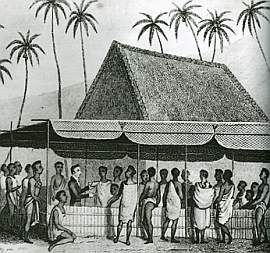Several people have asked questions about my post on praying in tongues from earlier this week, so I thought I’d post a few more thoughts.
My reference texts:
Now there are varieties of gifts, but the same Spirit; and there are varieties of service, but the same Lord; and there are varieties of activities, but it is the same God who empowers them all in everyone. To each is given the manifestation of the Spirit for the common good. For to one is given through the Spirit the utterance of wisdom, and to another the utterance of knowledge according to the same Spirit, to another faith by the same Spirit, to another gifts of healing by the one Spirit, to another the working of miracles, to another prophecy, to another the ability to distinguish between spirits, to another various kinds of tongues, to another the interpretation of tongues. All these are empowered by one and the same Spirit, who apportions to each one individually as he wills.
—1 Corinthians 12:4-11
And God has appointed in the church first apostles, second prophets, third teachers, then miracles, then gifts of healing, helping, administrating, and various kinds of tongues. Are all apostles? Are all prophets? Are all teachers? Do all work miracles? Do all possess gifts of healing? Do all speak with tongues? Do all interpret? But earnestly desire the higher gifts. And I will show you a still more excellent way.
—1 Corinthians 12:28-31
In a nutshell, here’s what I believe about the charismatic gifts:
- The gifts are still for today.
- Some of the gifts are more rare than what we see expressed.
- Not all people will have all gifts.
- A person who lacks a particular gift is not a lesser Christian for that lack because he or she may possess other “compensatory” God-given talents and anointings.
- We should always ask God for empowering through the gifts yet be satisfied should He elect not give us a particular gift on our timetable.
- Sometimes there is a long delay between asking for and receiving a gift.
- As the Lord sees fit, some gifts may only be given for a time or season.
- Because the Lord gives to us according to our measure of faith, He will not give charismatic gifts to people who don’t believe that they are still in operation.
- While a person may appear to have a gift, it may indeed be nothing more than a well-developed talent and lack the full nature of a genuine charismatic gift.
- As with all spiritual abilities, as we grow in the Lord we better understand how to use the charismatic gifts He has given us.
- The Lord may remove gifts from people who fail to properly use them.
- Yes, sadly, some people fake gifts.
- People who fake gifts should be exposed immediately and not tolerated.
- Yes, the Enemy does mimic some gifts and empower deceived people with ungodly versions.
- All gifts must be tested.
- Churches that support the gifts must do a better job policing those who use them in public.
- Church leaders are responsible for encouraging and discouraging the use of the gifts by their congregants.
- We are a poorer Church if we fail to use the gifts.
A convenient way to break down the gifts is into three categories of three gifts each:
Gifts of Discernment:
Word of knowledge
Word of wisdom
Discerning of spirits
Gifts of Power:
Faith
Miracles
Healing
Gifts of Proclamation:
Prophecy
Tongues
Interpreting tongues
 I feel strongly that one of our greatest failings in our churches is that our spiritual leaders are not calling out the gifts in people. By that I mean that too many churches rely on people self-identifying their own spiritual gifts rather than the leadership of the church doing it. Of course, this necessitates that the leaders of a church actually KNOW their people well and spend time helping each individual cultivate the gifts (and talents) God has given them. (Kind of precludes being an anonymous face in a megachurch, doesn’t it?)
I feel strongly that one of our greatest failings in our churches is that our spiritual leaders are not calling out the gifts in people. By that I mean that too many churches rely on people self-identifying their own spiritual gifts rather than the leadership of the church doing it. Of course, this necessitates that the leaders of a church actually KNOW their people well and spend time helping each individual cultivate the gifts (and talents) God has given them. (Kind of precludes being an anonymous face in a megachurch, doesn’t it?)
Instead, too many churches have let their leadership off the hook by resorting to congregant self-identification of gifts, often through spiritual gift inventories—a recipe for disaster, if you ask me. Gift inventory checklists are responsible for myriad people being placed in the wrong positions within a church or trying to use gifts they don’t truly have, thus leading themselves and others astray. My experience has been that too many people identify wants rather than gifts through this inventory methodology. If I want to be a prophet and fancy myself one, how will I fill out my gift inventory? Sort of self-fulfilling, isn’t it? And that makes for enormous problems.
Now, what is your take on the charismata?

 He is steady, “faithful,” always in his accustomed place (like the old field), conservative, and something of a landmark in the little church. But he is fruitless. The curse of such a life is that it is fixed, both in size and in content. To be has taken the place of to become. The worst that can be said of such a man is that he is what he will be. He has fenced himself in, and by the same act he has fenced out God and the miracle.
He is steady, “faithful,” always in his accustomed place (like the old field), conservative, and something of a landmark in the little church. But he is fruitless. The curse of such a life is that it is fixed, both in size and in content. To be has taken the place of to become. The worst that can be said of such a man is that he is what he will be. He has fenced himself in, and by the same act he has fenced out God and the miracle. I had folks from my church praying that one day I’d have the opportunity to serve as a missionary in some capacity.
I had folks from my church praying that one day I’d have the opportunity to serve as a missionary in some capacity.